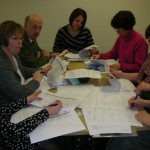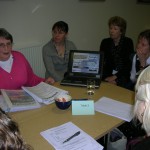Tuesday
Apr062010
Librarians' Information Literacy Annual Conference (LILAC) 2010
 Tuesday, April 6, 2010 at 4:52PM
Tuesday, April 6, 2010 at 4:52PM
This years LILAC took place in Limerick with both John Crawford and myself presenting the last of the Scottish Information Literacy Projects which appropriately dealt with:
The sessions were well attended and in true project style dealing with little covered information literacy areas / issues. The work of the project was acknowledged by project partners Lesley Thomson, Jenny Foreman and Morag Higgison, and Andy Jackson and by Bob Glass from Manchester Metropolitan University (didn’t realise that Bob was musical until I heard him play the guitar and sing at the networking evening)) who chaired John’s session.
Lesley’s presentation Developing an information literacy community of practice in Scotland was really interesting and I plan to continue participating in the community despite the end of the project and would recommend others to join. Just email Lesley.Thomson@scotland.gsi.gov.uk or Jenny.Foreman@scotland.gsi.gov.uk
Jenny and Morag’s presentation Scottish Government information literacy in the work place - measuring impact gave an insight into their information literacy work within the Scottish Government and their investigation measuring the impact. Ralph Catts (Senior Research Fellow at Stirling Institute of Education) one of the keynote speakers attended their session and commended them for evaluating what they were doing as it would be important in the difficult times ahead. Unfortunately I didn’t get to hear his entire keynote ‘Evaluating the Impact of Information Literacy’ as I had a plane to catch. I did hear the other keynotes including Tony Durcan Head of Culture, Libraries and Lifelong Learning for Newcastle City Council who spoke about the role of information literacy and public libraries ‘Information is as vital to the healthy functioning of communities as clean air, safe streets, good schools and public health’
Andy Jackson was as ever thought provoking in his session / workshop Just enough education to perform: Information skills, professionalism and employability. He certainly made those who attended think as he suggested that HE needs to look further at graduate attributes and refocus their information skills teaching more towards the graduate. He cited the work of “Simon Barrie (2006; 2008) and others on concepts of ‘graduateness’ places information skills at the heart of what it is to be a graduate”. He also highlighted that HE should
The workshop activities he had us doing included thinking about What professional skills did we learn which have been useful in our career? And What attitudes or values did we feel we developed through attending University?. The next activity was we had to select an information skills activity from a list of six he gave us (the group I was in selected – Effective Internet searching) we were also given two Graduate Attributes (we had Develop enterprise skills and commercial awareness and Hold a perspective that acknowledges local, national and international concerns) which we were to build into a learning activity. Then we had to create a brief plan for our learning activity. The examples given in the feedback were interesting and I hope people went away and as Andy suggested actively sought out what their university was doing regarding garduateness and employability and engage with it demonstrating the role of the library / librarians.
Other presentations I attended included Geoff Walton’s ‘Having a shufti: using focus group findings to map unchartered territory in the information literacy landscape’ – informative as ever in relation to the learning support tool ASK (Assignment Survival Kit) http://www.staffs.ac.uk/ask/ I also attended Ruth Stubbing and Jo Myhill’s presentation Developing librarians as teachers to enhance the learner experience to hear about SirLearnaLot an online tutorial that aims to help library staff enhance their understanding of pedagogy so that they can feel confident in designing and delivering teaching.
There were a couple of interesting Posters:
The project also got national mentions from both Wales and Ireland. A mention from Cathie Jackson (Cardiff University) who in her presentation An information literacy strategy for Wales: towards a national framework acknowledged that their inspiration came from the Scottish Information Literacy Project. Great news that they have got nine months funding to employ a project officer to take things forward for them and I wish them all the best. Ireland has also been inspired by the project and Dr Philip Cohen (Head of Library Services, Dublin Institute of Technology) attended both the project sessions and Lesley Thomson’s session on the community of practice in Scotland. I spoke to Philip and Siobhán Fitzpatrick the President of the Library Association of Ireland at the conference dinner and Siobhán gave us a mention in her address after the conference dinner. It is great to think that we have inspired so many people and countries.
It was also good to hear the minister who opened the conference that information literacy was a key support for lifelong learning and that the role of librarian and education was crucial at this time for developing the individual.
Christine Irving scotinfolit@googlemail.com
- Begin at the Beginning: Information and Critical Literacy in Curriculum for Excellence Early & First Level (Nursery and Primary Schools) (powerpoint presentation) Begin at the beginning - Information Literacy in primary schools (presentation abstract) - Christine Irving
- Employability and information literacy: a review of a training programme (abstract) Information literacy in employability training: the experience of Inverclyde Libraries. Evaluating a training programme (powerpoint presentation). - John Crawford
The sessions were well attended and in true project style dealing with little covered information literacy areas / issues. The work of the project was acknowledged by project partners Lesley Thomson, Jenny Foreman and Morag Higgison, and Andy Jackson and by Bob Glass from Manchester Metropolitan University (didn’t realise that Bob was musical until I heard him play the guitar and sing at the networking evening)) who chaired John’s session.
Lesley’s presentation Developing an information literacy community of practice in Scotland was really interesting and I plan to continue participating in the community despite the end of the project and would recommend others to join. Just email Lesley.Thomson@scotland.gsi.gov.uk or Jenny.Foreman@scotland.gsi.gov.uk
Jenny and Morag’s presentation Scottish Government information literacy in the work place - measuring impact gave an insight into their information literacy work within the Scottish Government and their investigation measuring the impact. Ralph Catts (Senior Research Fellow at Stirling Institute of Education) one of the keynote speakers attended their session and commended them for evaluating what they were doing as it would be important in the difficult times ahead. Unfortunately I didn’t get to hear his entire keynote ‘Evaluating the Impact of Information Literacy’ as I had a plane to catch. I did hear the other keynotes including Tony Durcan Head of Culture, Libraries and Lifelong Learning for Newcastle City Council who spoke about the role of information literacy and public libraries ‘Information is as vital to the healthy functioning of communities as clean air, safe streets, good schools and public health’
Andy Jackson was as ever thought provoking in his session / workshop Just enough education to perform: Information skills, professionalism and employability. He certainly made those who attended think as he suggested that HE needs to look further at graduate attributes and refocus their information skills teaching more towards the graduate. He cited the work of “Simon Barrie (2006; 2008) and others on concepts of ‘graduateness’ places information skills at the heart of what it is to be a graduate”. He also highlighted that HE should
- seek ways of engaging with the professions
- offer focused training
- make connections with local employment forums, skills agencies etc
- develop the workplace information profession.
The workshop activities he had us doing included thinking about What professional skills did we learn which have been useful in our career? And What attitudes or values did we feel we developed through attending University?. The next activity was we had to select an information skills activity from a list of six he gave us (the group I was in selected – Effective Internet searching) we were also given two Graduate Attributes (we had Develop enterprise skills and commercial awareness and Hold a perspective that acknowledges local, national and international concerns) which we were to build into a learning activity. Then we had to create a brief plan for our learning activity. The examples given in the feedback were interesting and I hope people went away and as Andy suggested actively sought out what their university was doing regarding garduateness and employability and engage with it demonstrating the role of the library / librarians.
Other presentations I attended included Geoff Walton’s ‘Having a shufti: using focus group findings to map unchartered territory in the information literacy landscape’ – informative as ever in relation to the learning support tool ASK (Assignment Survival Kit) http://www.staffs.ac.uk/ask/ I also attended Ruth Stubbing and Jo Myhill’s presentation Developing librarians as teachers to enhance the learner experience to hear about SirLearnaLot an online tutorial that aims to help library staff enhance their understanding of pedagogy so that they can feel confident in designing and delivering teaching.
There were a couple of interesting Posters:
- So-Young Kim (University of Tokyo) - What are the Post-Effects of Japan's National Curriculum Standards? : Inquiry based Learning and Elementary School Libraries. So-Young Kim attended my presentation and was very interested in the work I was doing in schools.
- Katherine Reedy (Open University) - i-know at the OU: information skills for the 21st century workplace. I have posted about this work previously.
- Sheila Corrall (University of Sheffield) - Mapping Information Literacy Strategy. Sheila has done a lot of work in this area.
The project also got national mentions from both Wales and Ireland. A mention from Cathie Jackson (Cardiff University) who in her presentation An information literacy strategy for Wales: towards a national framework acknowledged that their inspiration came from the Scottish Information Literacy Project. Great news that they have got nine months funding to employ a project officer to take things forward for them and I wish them all the best. Ireland has also been inspired by the project and Dr Philip Cohen (Head of Library Services, Dublin Institute of Technology) attended both the project sessions and Lesley Thomson’s session on the community of practice in Scotland. I spoke to Philip and Siobhán Fitzpatrick the President of the Library Association of Ireland at the conference dinner and Siobhán gave us a mention in her address after the conference dinner. It is great to think that we have inspired so many people and countries.
It was also good to hear the minister who opened the conference that information literacy was a key support for lifelong learning and that the role of librarian and education was crucial at this time for developing the individual.
Christine Irving scotinfolit@googlemail.com





